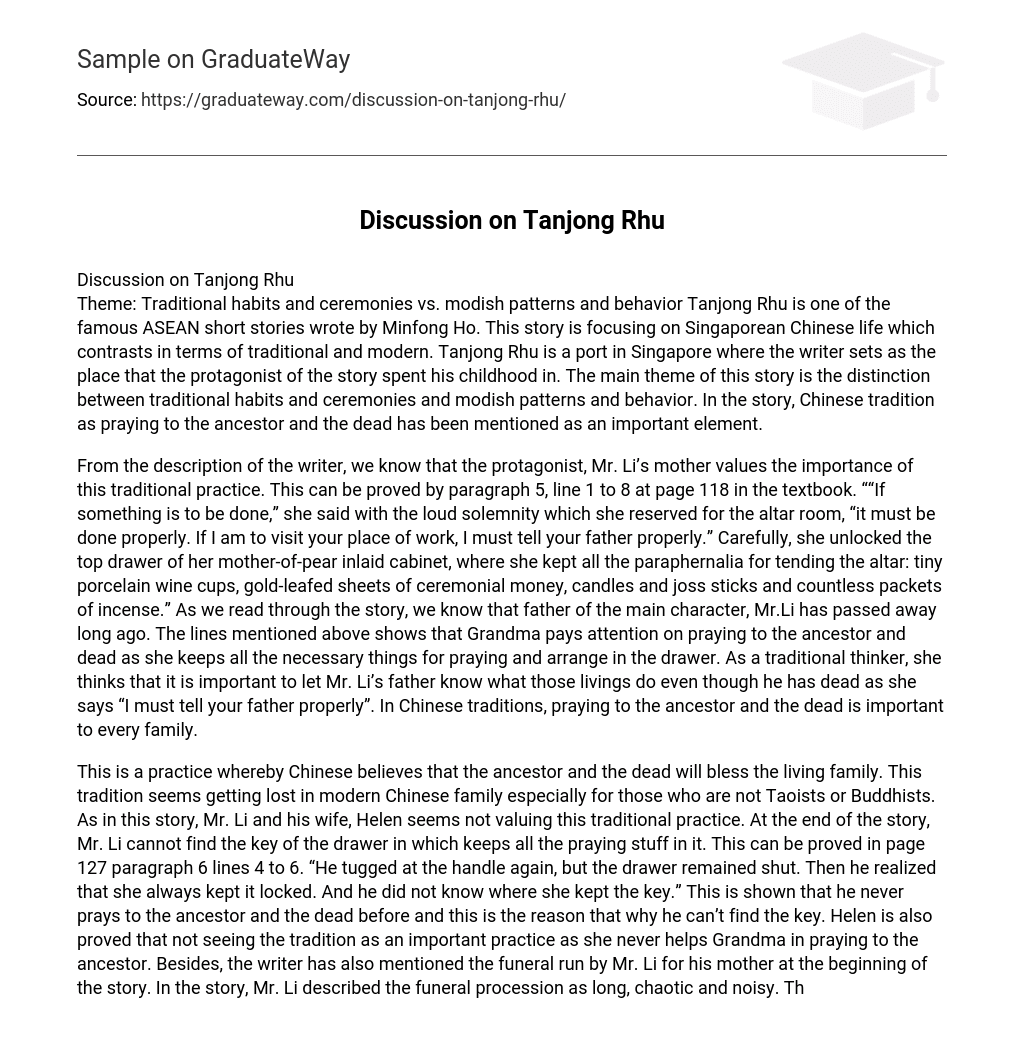The short story “Tanjong Rhu” by Minfong Ho, an ASEAN author, delves into the contrasting elements of traditional and modern Singaporean Chinese culture. Taking place in Tanjong Rhu, a well-known port in Singapore, the protagonist’s early life unfolds. The narrative primarily focuses on the juxtaposition between age-old customs like ancestor worship and contemporary modes of conduct.
According to the writer, it is clear that Mr. Li’s mother highly values traditional practices as mentioned in paragraph 5, lines 1 to 8 on page 118 of the textbook. She strongly believes in doing things correctly and expresses this by saying, “If something is to be done, it must be done properly. If I am to visit your place of work, I must inform your father properly.” Her commitment to these traditions is also evident in her careful unlocking of the top drawer in her mother-of-pearl inlaid cabinet where she stores various items such as small porcelain wine cups, ceremonial money with gold leaf, candles, joss sticks, and multiple packets of incense used for tending the altar.”
As we read through the story, we learn that the main character’s father, Mr. Li, passed away a long time ago. The mentioned lines reveal that Grandma is devoted to honoring and communicating with her ancestors and the deceased, as she keeps all the necessary items for prayer and arranges them in a drawer. Being a traditional thinker, she believes it is crucial to inform Mr. Li’s father about the present happenings, even though he has passed away, as she states, “I must tell your father properly.” In Chinese culture, paying respects to ancestors and the deceased holds significance for every family.
Chinese tradition believes in the practice of ancestor and spirit worship, where the deceased are believed to bless their living family members. However, this tradition is fading in modern Chinese families, especially for those who do not follow Taoism or Buddhism. In the story, Mr. Li and his wife, Helen, do not seem to place value on this traditional practice. Towards the end of the story, Mr. Li is unable to find the key to the drawer where all the prayer items are kept, highlighting his unfamiliarity with this aspect. This can be seen on page 127, paragraph 6, lines 4 to 6: “He tugged at the handle again, but the drawer remained shut. Then he realized that she always kept it locked. And he did not know where she kept the key.”
The text reveals that he has never prayed to the ancestors or the deceased before, which explains why he cannot find the key. Helen also demonstrates her disregard for tradition by not assisting Grandma in ancestral prayers. Additionally, the writer mentions Mr. Li’s mother’s funeral at the beginning of the story. Mr. Li describes the funeral procession as lengthy, chaotic, and noisy, which is evident in line 5 of paragraph 2 on page 114. Chinese funeral processions are a traditional practice passed down from one generation to the next. During these processions, the family of the deceased hires a monk to lead the blessing ceremony.
In the Chinese tradition of a funeral procession, a monk recites scriptures to bless and honor the deceased while family members walk in circles behind. It is important for someone to mourn or grieve as it represents the spirit’s solitude and attracts divine attention, aiming to guide the spirit towards nirvana. This is why Mr. Li characterizes the funeral procession as chaotic and noisy. Typically lasting three to five days, the procession enables loved ones and friends to bid farewell to the departed soul.
Chinese tradition dictates that during the funeral procession, the family of the deceased adheres to specific customs. These include following a vegetarian diet and burning paper items believed to be used by the spirit of the departed after death. The coffin will remain in place for three to five days before being transported to the cemetery. During this procession, either the head of the family or their successor carries either the coffin or a picture of the deceased while walking a designated distance.
During the walk, the hell banknote will also be scattered. The entire funeral procession is seen as a way to pray for the deceased spirit, allowing it to depart peacefully. Mr. Li perceives the funeral procession as a complex and lengthy affair. However, many contemporary Chinese families do not place great importance on the procession. Some even choose not to hold a funeral procession at all, or only have one for a day or two. Modern thinkers believe that praying during the funeral procession serves no purpose as the deceased cannot hear or comprehend the actions of the living. They believe it is more important to care for the dying instead of focusing on an elaborate procession.
Mr. Li’s dissatisfaction with the funeral procession for his mother may also stem from this reason. We, as a modern generation, believe that Chinese traditions should be passed down to future generations. These traditions represent the rich history and culture of China, spanning over 5000 years. They are an integral part of the ethnic identity and losing them would diminish their significance. Hence, it is crucial for the modern generation to preserve these traditions to ensure the continuity of the ethnic heritage and prevent their disappearance.
References
- Comber, L. (2005). Prizewinning ASEAN Fiction (pp. 113-128). Hong Kong: Times Edition – Marshall Cavendish.
- Loh, M. (n.d.). Culture and Change: The Rise of the Singapore Short Story in English. In The Domain of Fiction.





